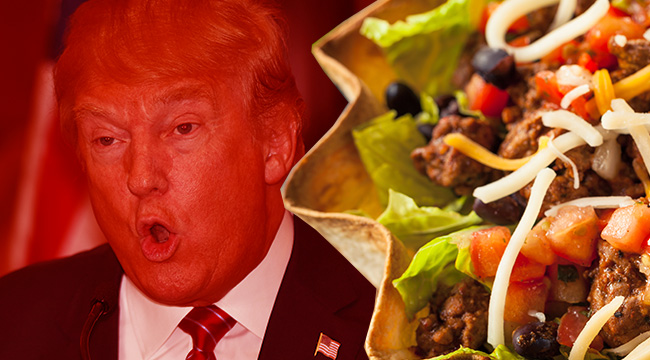
Yesterday, the presumptive Republican presidential nominee, Donald J. Trump, made headlines after he tweeted out this photo on Cinco de Mayo:
Happy #CincoDeMayo! The best taco bowls are made in Trump Tower Grill. I love Hispanics! https://t.co/ufoTeQd8yA pic.twitter.com/k01Mc6CuDI
— Donald J. Trump (@realDonaldTrump) May 5, 2016
Whether or not the man who said, “I will build a great, great wall on our southern border, and I will make Mexico pay for that wall. Mark my words,” actually loves Hispanics — a polarizing term in itself — is a point of hot contention.
However, the internet wasn’t riled up about that. It was riled up over the “authenticity” of taco bowls, as well as the fact that Cinco de Mayo isn’t a Hispanic holiday — it’s uniquely Mexican. Even Full Frontal‘s Samantha Bee chimed in!
The best taco bowls are made by immigrants who resent a rich prick calling them rapists. Love inauthentic Mexican! pic.twitter.com/9tEORJxoZp
— Samantha Bee (@realsambee) May 5, 2016
Does Trump deserve to be called out on his thinly-veiled pandering to a population he has greatly offended? Absolutely! Should the taco bowl (or taco salad on the West Coast) be maligned right along with him? Maybe not. Gustavo Arellano — who writes the syndicated column ¡Ask a Mexican! and literally wrote the book on Mexican food in America — told Uproxx he has some different thoughts about the authenticity of dish.
“There’s no such thing as ‘actual legit Mexican cuisine’,” he explained. “It’s all Mexican one way or another.”
People fall all over themselves to determine the authenticity of cultures, hoping for a final word on what’s “real” and what’s not. These questions are particularly complicated when it comes to food, and the line between influence, fusion, and appropriation is a murky one.
Arellano explains that the taco bowl is actually a descendant of the “tacup” which was served at Casa de Fritos in Disneyland. The original concoction was cheese and ground beef inside of a bowl made of Fritos. The restaurant called itself “authentic Mexican” and was owned by Frito-Lay.
“The family that ran that restaurant for Frito-Lay was Mexican and would go on to create Doritos,” Arellano says. “Those Doritos were so important to Frito-Lay vice president Arch West that they were sprinkled on his grave at his funeral.”
Nowadays, in our quest for true authenticity (and our longing desire to call out Trump), it’s easy to forget the stories of Mexican people who created original recipes — even if those discoveries happened in Disneyland in a restaurant owned by Frito-Lay.
Arellano made another important point in a piece he wrote for The OC Weekly about the outrage Trump’s tweet has caused. Responding to a piece in The New York Times in which Janet Murguía, president of the National Council of La Raza, said she didn’t know of any “self-respecting Latino” who would acknowledge the taco bowl as part of their culture, Arellano pointed out that we should be attacking Trump on his policies and rhetoric, not debating whether what he’s eating is truly authentic.
“With all due respect to Murguía, who fights the good fight,” Arellano writes, “she’s obviously never been in the cafeteria line at a Southwest high school, where Mexican kids have doctored taco salad with bottles of hot sauce since at least the 1970s.” Suggesting that taco bowls aren’t part of Latino culture ignores, “the crucial role Mexicans played in the development of the taco salad.”
That’s the real point here: Feelings about Trump aside, there’s no sense in attacking the taco bowl as “fake” Mexican food. Arellano is on point: Every food product invented by a Mexican person is authentic Mexican fare.






